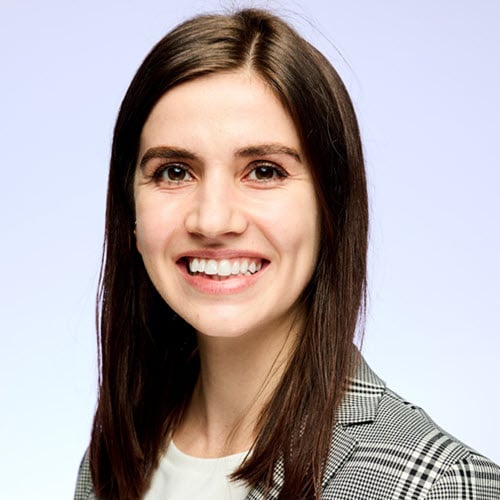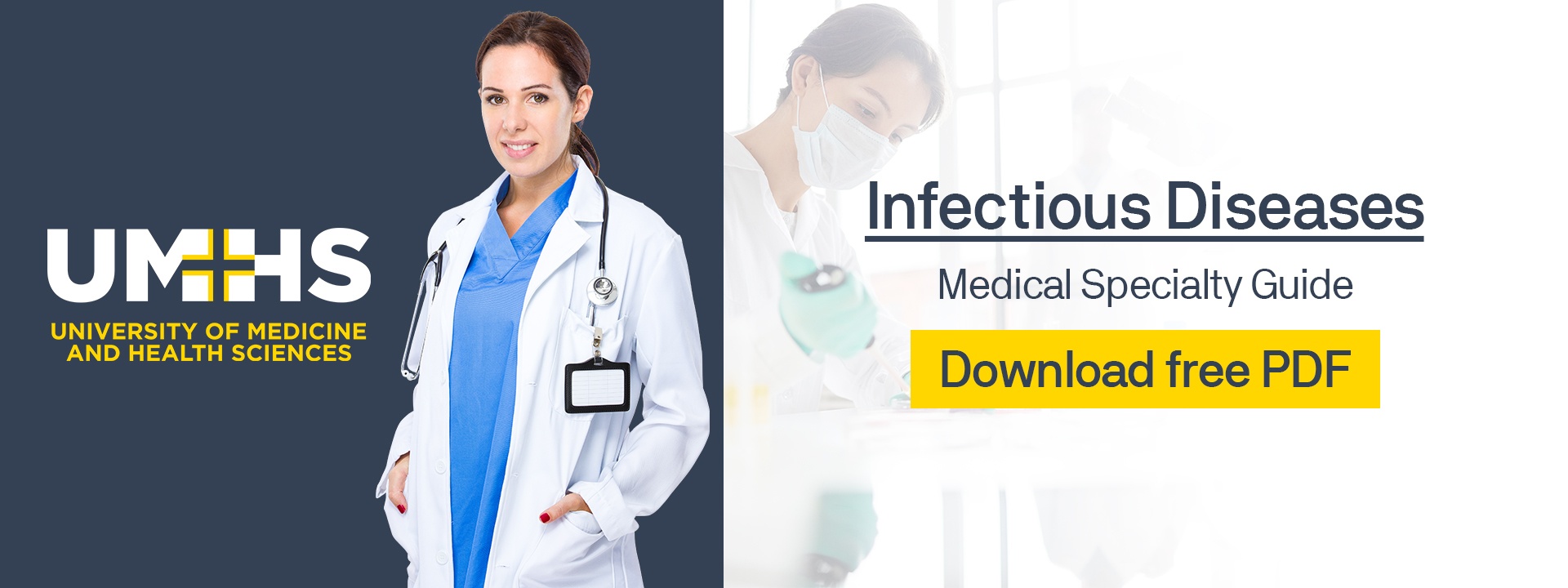In infectious disease (ID) specialist is a physician who treats patients with a variety of infectious viruses, bacteria, and other illnesses. They practice their skills within a hospital and outpatient clinic setting. These infectious disease specialists require a lot of medical training including medical school, residency, and fellowship. In this article we will cover how to become an ID doc, what they do, their salary, and more.
Quick Navigation links and FAQs
- What is an Infectious disease doctor?
What do Infectious disease specialists do? - How to become an ID doctor?
- Where do ID doctors work?
- How much do Infectious disease physicians make?
- FAQs about ID Doctors
- How many years to become an Infectious disease specialist?
- Is becoming an ID doctor hard?
- What are the career opportunities for an Infectious disease doctor?
- Getting started in medicine
What is an Infectious Disease Doctor?
An infectious disease doctor is a physician that has completed training allowing them to specialize in treating a variety of infectious diseases that affect the public including viruses, bacterial infections, fungal infections, parasitic infections etc. Infectious disease physicians work both in a hospital and in a clinic setting where they treat patients of all ages. Generally, pediatric infectious disease doctors treat children while regular infectious disease physicians treat adults. Some of the most common infections that an infectious disease specialist treat include bacterial infections (bacteremia, wounds, pneumonia), hepatitis, human immunodeficiency virus (HIV), and other viral infections.
What does an Infectious Disease Doctor do?
An infectious disease (ID) physician diagnoses, manages, and treats a variety of different infectious conditions that include bacteria, viruses, fungus, and parasitic infections. These specialists work both in a clinic outpatient setting and within the hospital. In clinic, ID physicians see patients for many reasons, some examples include:
- Discussing treatment options with a patient that is newly diagnosed with Hepatitis C
- Monitoring a patient with a surgical site infection requiring antibiotic treatment
- Prescribing prophylactic treatment for patients traveling to tropical locations with infections such as malaria
- Overseeing response to antibiotic therapy in a diabetic patient with a wound on their foot
- Diagnosing or ruling out a tick-borne illness in a hunter with recent fever and rash
When working in a hospital, an infectious disease MD or DO's duties may vary slightly from a clinic setting. ID physicians are specialists meaning they see hospitalized patients on a consult basis. This means that hospitalists, who are the primary care takers for hospitalized patients, will request that an ID doctor consult, or see, their patient. Some examples of what an infectious disease specialists do in a hospital include:
- Establishing a rare diagnosis in a patient with fever of unknown origin (FUO)
- Creating a treatment plan for a septic patient with bacteremia (bacteria circulating in their blood)
- Prescribing an antibiotic regimen in a patient with a polymicrobial prosthetic knee infection
- Treating a fungal infection in a patient undergoing chemotherapy
- Providing prophylaxis for infectious diseases in an immunosuppressed patient who received a organ transplant

How to Become an Infectious Disease Doctor?
You may be wondering how to become an infectious disease specialist. The path takes many years of hard work with many requirements before becoming an infectious disease doctor. The following are the steps to be an infectious disease doctor:
Get accepted into medical school:
The first step in becoming an ID physician is matriculating into medical school. Medical school admission is notoriously difficult and requires completion of many prerequisites courses and extracurricular activities.
Complete the USMLE and COMLEX board examinations:
Once in medical school, there are three medical board examinations that must be completed. MD, or allopathic medical students take the United States Medical Licensing Exams (USMLE). On the other hand DO, or osteopathic medical students take the Comprehensive Osteopathic Medical Licensure Examinations (COMLEX). There are three medical board examinations for both the USMLE and COMLEX. The first two exams are taken during medical school, while the USMLE Step 3 and COMLEX Level 3 are taken during residency. The first medical exam, Level 1 or Step 1 is taken after the first two years of medical school. The second exams, Level 2 and Step 2, are taken after completion of the third year of medical school. Passing and obtaining a good score on the USMLE and COMLEX exams are vital to match into a good residency.
Match into and complete residency:
During the last years of medical school, students must begin thinking about what specialty they want to apply to and during the last year, medical students will begin to actually apply to residency programs. In order to become an infectious disease specialist, one must first complete either an internal medicine or pediatric residency. Both medical residencies last three years. Pediatric trained specialists will eventually treat children with infectious diseases while internal medicine trained specialists will treat adults with infectious diseases.
Pass board examinations:
During the last year of residency, residents must take a board examination related to their medical specialty. As mentioned above, infectious disease physicians have the option to complete either internal medicine or pediatric residencies. This means that at the end of their medical residency they will study for and take boards. It is vital to pass boards in order to move onto the next step of training to become an ID doctor- fellowship.
Match into and complete an infectious disease fellowship:
During the last two years of residency, medical residents may start to look into which fellowship they would like to complete. The process for applying to fellowship is often very similar to applying to residency. Medical applicants will fill out an application and submit it to programs they are interested in. Based on their application, fellowship programs will decide whether or not to grant them an invitation to interview. After interviewing, if residents are a good candidate they may be invited to fill a fellowship position. Alternatively, some fellowships may use the same match program that residencies use.
Pass infectious disease board examinations:
Infectious disease fellowship lasts two years for normal ID and three years for pediatric infectious disease. Similar to residency, there is a board examination that must be passed near the end of training. The exam is difficult and long, but passing is vital to securing a job as a fully trained Infectious disease physician able to fully practice medicine.
Discover if a career in Infectious Disease is right for you.
Learn why 85% of doctors would choose the same specialty again.
Where do infectious disease doctors work?
Infectious disease physicians have two main locations in which practice medicine- outpatient clinics and inpatient hospitals. While their location is different, infectious disease physicians may treat similar conditions and patients in both sites. In general, outpatient patients will usually be healthier while hospitalized inpatient patients will be much sicker. For both patient populations, infectious disease physicians will diagnose their infections, provide treatment guidelines, order and interpret laboratory tests and monitor treatment response. While most infectious disease specialists will work in both settings, there may be few doctors who choose to work in either the clinic or hospital medical setting.

Infectious Disease Doctor's salary - How much do ID doctors make?
Most infectious disease specialists work in academic medicine within a hospital (as compared to private practice). The salary of ID physician can be separated based on their position as either an assistant processor or a full/associate professor. For adult infectious diseases specialists their salaries are:
- Assistant professor average salary: $186,245
- Associate/full professor: $242,878
For pediatric infectious disease specialists that work in academic medicine, their salaries are:
- Assistant professor average salary: $158.801
- Associate/full professor: $219,306
These figures are provided by the AAMC, however, it is important to note that salaries may vary widely depending on the type of job, location, responsibilities etc.
Frequently Asked Questions about Infectious Disease Specialists
Here are some FAQs that our admissions staff get asked about Infectious diseases as a medical specialty.
How many years does it take to become an Infectious Disease physician?
When discussing how to become and ID specialist, it is important to discuss the long timeline of training. As mentioned above, there are two different types of infectious disease specialists, ones that work with adults and ones that work with children. The career path to becoming an infectious disease doctor varies based on adult vs. pediatric training. For both infectious diseases path, one must first complete medical school which lasts four years. After that, the length of residency and fellowship differs:
- Adult infectious disease: 4 years of medical school, 3 years of internal medicine residency, and 2 years of infectious disease fellowship training
- Pediatric infectious disease: 4 years of medical school, 3 years of pediatric residency, and 3 years of infectious disease fellowship training
Thus, the route to becoming a pediatric infectious disease physician lasts one more year than that of the medical training to be a adult infectious disease physician.
Is becoming an ID Doctor hard?
Yes, the path that infectious disease doctors must complete in order to be fully trained is very challenging. Each step of training, pre-medical requirements, medical school, applying to residency, completing residency, passing boards, applying to fellowship, completing fellowship, and passing specialty boards comes with its own challenges and difficulties. Some challenges include the amount of time spent working/studying, difficult schedules with overnight shifts and calls, the mental challenge of learning so much new material, learning to interact with patients and staff members, and preparing to pass multiple board examinations.
During the path to become an infectious disease doctor, the amount of hours required to studying both during school and residency are immense. During school, students will often only take 2-3 hours of time off during the day. This can be spent eating, working out, or relaxing. Residency may have similar clinical hours for infectious disease doctors. While there is an 80 hour per week work limit, this is often approached or broken. Another challenge is the changing work hours. Infectious disease doctors, even during residency, often will need to work overnight and/or take call overnight as well. This disruption to the sleep schedule can be hard to manage.
Another challenge is the sheer amount of information the students have to learn during school, residency, and ID fellowship. It requires an immense amount of dedication in order to properly memorize and understand all the medical knowledge. There are a wide variety of infectious diseases in which an ID specialist much learn how to diagnose, manage and treat. It is vital to properly understand the medical knowledge of the different infectious diseases in order to finish training and pass clinical board examinations.

What medical career opportunities are available for an ID specialist?
Following completion of an Infectious disease fellowship there are several subspecialty areas of focus that an ID specialist can train in. While there are usually not further fellowships in the following areas, infectious disease specialists may choose to focus their training on one area and see patients related to this area. Some possible options include:
- HIV/AIDS
- Tropical Medicine
- Hepatitis
- Malaria
- Public Health
- Tuberculosis
- Transplant Infectious Disease
How to pursue a career as a Medical Doctor specializing in Infectious diseases?
The road to becoming an ID specialist is long and arduous, but begins with getting accepted into a medical school such as The University of Medicine and Health Sciences. To find out more about UMHS click here. To apply, please start an online application or submit your AMCAS or AACOMAS here.
Popular and related content.
We invite you to check out these popular and related articles. Click on the underlined links!

Callie Torres is a double board-certified physician, a freelance health and medical writer, as well as an author of many peer-reviewed medical articles.





















